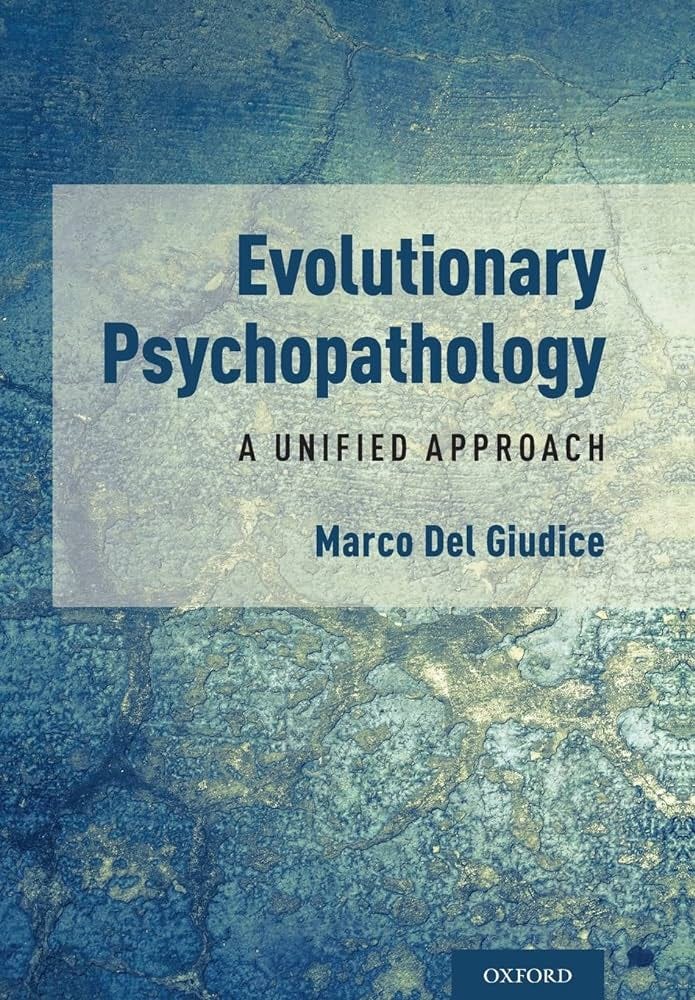Evolutionary Psychiatry & Laith Al-Shawaf
Dr Gurjot Brar & Professor Henry O'Connell interview Assoc. Prof. Laith Al-Shawaf based at the University of Colorado, Colorado Springs.
Thank you so much for taking the time to do this! Perhaps we can begin by you introducing yourself for those who don’t know you?
Thanks for inviting me! My name is Laith Al-Shawaf. I’m a psychologist, but I have a mixed background that also includes biology, anthropology, philosophy, and cognitive science. I grew up in Lebanon, got my PhD in the States, worked in Turkey and Germany for a while, and am now based at the University of Colorado in the U.S.
Professionally, I’m an Associate Professor in the Department of Psychology at the University of Colorado in Colorado Springs, with secondary appointments at the Center for Cognitive Archaeology and the Lyda Hill Institute for Human Resilience, also at the University of Colorado in Colorado Springs. In 2024, I'll be a Visiting Fellow at the Institute for Advanced Study in Toulouse, France.
My empirical research centers on human emotions, but I also study cognitive biases and personality and individual differences, and I do as much of my research cross-culturally as possible.
I also write popular science essays (which are accessible here), and am the primary editor of The Oxford Handbook of Evolution and the Emotions (here).
In my free time, I like reading, writing, traveling, hiking and exploring the great outdoors, and sharing meals and games with friends.
How were you introduced to the field and what interests you about evolutionary psychiatry?
I was first introduced to the field by Randy Nesse’s excellent books and articles. Interested readers should check out Why We Get Sick and Good Reasons for Bad Feelings, both by Nesse.
My interest in the field was also stoked by Evolutionary Psychopathology: A Unified Approach by Marco Del Giudice.
Jerry Wakefield’s work was also an important influence – especially his seminal analysis of what a “disorder” is (for example, see here).
There are also many excellent papers on evolutionary psychiatry that readers can find in journals that focus on psychiatry, psychopathology, and evolutionary medicine (for example, see here, here, and here).
I’d like to point interested readers to Randy Nesse’s personal website – it’s excellent, and it makes a wide range of his publications freely accessible.
What interests me about evolutionary psychiatry is that it provides a deeper level of explanation that is typically lacking in traditional approaches to psychiatry. In particular, it tackles the “ultimate” level of analysis (the why question) in addition to the “proximate” level (the how question), whereas traditional psychiatry has focused almost exclusively on the latter.
This is also true of medicine more broadly, and of psychology as well – bringing in an evolutionary perspective adds a key level of analysis that simply can’t be skipped if your goal is a comprehensive science of the mind, body, or behavior. This issue of “levels of analysis” is key, because any biological or behavioral discipline that ignores one of the two main levels of analysis will necessarily remain incomplete. To read more about this argument as it pertains to medicine, readers can click here, and for psychology, they can click here.
Beyond this, psychology and psychiatry are still missing their unifying paradigm – their guiding meta-theoretical framework that integrates findings, predicts new ones, ties the field together, and unifies the discipline with the other life sciences. The missing paradigm, if you ask me, has to be evolution. After all, it’s the unifying paradigm of all the other life sciences, and psychology and psychiatry are both obviously life sciences as well. They’re both disciplines about biological organisms that investigate how those organisms’ bodies, minds, and behavior work – so how could they help but fall under the same umbrella that unites and makes sense of all the other biological and life sciences?
Evolution provides psychology and psychiatry – both fascinating fields, but frankly a little adrift and a bit unmoored – with their missing foundation.

What insights does evolutionary psychiatry have to offer to improve on the current paradigm/mainstream psychiatry?
At a foundational level, it supplies psychiatry and psychology with their missing paradigm, as noted above.
At a key conceptual level, it clearly delineates the distinction between the how (proximate) and the why (ultimate). This key distinction has the capacity to speed up progress in the field, resolve unnecessary and stale disputes based on conflation of levels, and highlight gaps in knowledge. It is the background theoretical framework for all research in animal behavior and biology, and it ought to be in psychology and psychiatry as well.
At a more concrete and specific level, evolutionary psychiatry furnishes new insights about everything from anxiety and panic disorder to eating disorders to depression and OCD. At this level, it helps us understand why these disorders exist in the first place.
Importantly, evolutionary psychiatry doesn’t ask naïve Panglossian questions such “why did this disorder evolve?” or “what evolved function does this disorder serve?”. Instead, it asks the more nuanced – and more appropriate – question of why did natural selection leave us vulnerable to this disorder? Or to phrase it differently, why did we evolve in such a way that we are prone to this particular disorder? To read more about this distinction, and to get some answers to the question of why we’re so vulnerable to disorders in the first place, readers may wish to consult Randy Nesse’s excellent work on the subject. I also recently published an essay on evolutionary medicine that addresses the issue.
Finally, it’s possible that explaining to patients why we’ve evolved this way – with an overreactive anxiety response, a proneness to depression in certain circumstances, a susceptibility to the hedonic treadmill and so on can help normalize these conditions, reduce stigma about mental health, and encourage people not to punish themselves or be angry at themselves for having anxiety, mood fluctuations, or other mental health issues.
I understand you have a handbook coming out soon called "The Oxford Handbook of Evolution and the Emotions", edited by you and Todd Shackelford? Can you take us through a little bit of the process of how it came to be and what it involves?
Yes! I’m pretty excited about this. It should be coming out in early 2024. It consists of 67 chapters (you read that right!) divided into 4 sections.
The first section covers conceptual foundations. It outlines different ways of studying and thinking about emotions from an evolutionary perspective.
The second section includes many chapters on specific emotions – for example, love, jealousy, anger, hatred, pride, happiness, gratitude, disgust, shame, kama muta, regret, and many more.
The third and penultimate section discusses the role of emotions in daily life and in a variety of different domains – for example, we have chapters on emotions and the legal system, emotions and morality, emotions and politics, emotions and the status hierarchy, emotions and punishment, emotions in dogs, emotions in the Great Apes, emotions and forgiveness, emotions and motivated reasoning, and many more.
Finally, the fourth section is on the role of emotions in psychopathology and psychological disorders. It includes chapters on depression, anxiety, eating disorders, narcissism, psychopathy, borderline personality disorder, PTSD, OCD, addiction, and more. This section also includes key theoretical chapters on how to think about concepts like “dysfunction” and “disorder” from an evolutionary perspective.
You have many interdisciplinary interests, can you speak to how they arose and how they might be relevant to your main interests?
That’s true – in addition to psychology, I have some background in biology, anthropology, philosophy, and cognitive science. And within psychology, I’m interested in a very wide variety of phenomena and sub-fields, ranging from emotion to cognition to personality to psychopathology.
My interests started early, when I was a teenager thinking idly about things like free will, consciousness, and personhood. I didn’t have clear answers, obviously, but my curiosity led me to read as widely as I could, and I fell in love with psychology, biology, and philosophy pretty early on. As I’m sure your readers know, the boundaries between these fields bleed, and some of the professional boundaries we’ve constructed in our universities and textbooks are a bit arbitrary. Our departments and our classes might be subdivided like that, but the world isn’t really like that, and the really big questions often require one to read as widely as possible and traverse as many fields as possible.

The world is continuous, and if the job of science is to paint an increasingly accurate picture of the world, then the different sciences must agree with one another and – at a minimum – not violate each other’s principles. Because of this, consilience between the different sciences is a key principle. That’s one reason I’m interested in so many fields. A second reason is just that there’s so much that we don’t know, and the world’s a fascinating place! And a third is that I discovered early on that studying these other fields – such as biology and philosophy – made me a better psychologist. To those that are interested in psychology and psychiatry, I highly recommend reading widely in related fields.
What are you working on currently? And what's in store for you in the near future?
Hmmm. Lots of stuff! I just published a new piece on evolutionary medicine, which interested readers can access here.
I also have a new paper about levels of analysis in psychology out in the journal Psychological Review.
Beyond that, my students and I are working on a variety of questions in the areas of emotion, personality, mental health, and cognitive biases.
A potential new research area for us is why people believe in unsubstantiated “woo” (e.g., see here and here), and what can be done to reduce such harmful beliefs.
Another exciting development is The Oxford Handbook of Evolution and the Emotions, which will be published soon.
Where do you see evolutionary psychiatry will go in future, what kind of barriers do you foresee?
I think the field will continue to get broader and deeper.
By broader, I mean it will expand the range of phenomena and disorders it tackles.
By deeper, I mean it will generate more – and more nuanced – explanations & predictions about each condition it tackles.
I also think it will continue to get more practical, with tips and suggestions for treatment and prevention.
One useful direction would be greater integration with psychology. At the moment, I’m thinking about emotion science in particular, because that’s particularly relevant to psychiatry and mental health – but I think greater integration with psychology more generally would enrich both fields as they move forward.
I also think it’s important not to let crude evolutionary thinking – such as group selection or a naïve supposition that disorders evolved for a reason and serve a specific biological function – into the discipline. That kind of thinking isn’t widespread, but I’ve come across it on occasion, and it’ll be important to ensure that standards in the field remain high.
Finally, you ask about barriers. I think there are a few. Depending on where one is in the world, creationism may or may not be a major barrier to public acceptance. A second barrier is the difficulty in changing educational curricula – in this case, medical school curricula. A third issue is that students in many countries, such as the U.S., are woefully under-educated in evolutionary theory and evolutionary biology (for example, see here), which is of course the foundation of evolutionary psychiatry. A fourth and final barrier is the strain of human exceptionalism that is so prevalent in the social and psychological sciences – a lot of people are reluctant to admit that evolutionary considerations apply not just to nonhuman animals, but to humans too, and not just to the human body – bones and muscles and flesh – but also to the human mind. After all, the mind is a product of the brain, and if you accept that the body (which includes the brain) evolved, then the conclusion that the human mind is a product of evolution is unavoidable.

Despite the obstacles, I remain optimistic. We just have to do what we can: keep conducting new research, continue writing articles in the popular press to reach a broader audience, help bust myths and misconceptions, and do more empirical research on psychopathology from an evolutionary perspective . Despite the obstacles, I think evolutionary psychiatry will continue to grow, thriving and reaching more and more people over time. We’re living in a mini-intellectual revolution, and if you ask me, it’s a pretty exciting time for medicine, psychiatry, and psychology!
Excellent! Thank you again for speaking with us today, if people want to check out more of your work where can they go?
Thanks for inviting me! Here are some links people can check out if they're interested:
Website:
https://www.laithalshawaf.com/
(Popular science essays can be accessed via the “Popular Science” tab)
Twitter/X: https://twitter.com/LaithAlShawaf or @LaithAlShawaf
The Oxford Handbook of Evolution and the Emotions: https://global.oup.com/academic/product/the-oxford-handbook-of-evolution-and-the-emotions-9780197544754?cc=us&lang=en&
University of Colorado Faculty Profile (for example, for students who may wish to join my lab): https://psychology.uccs.edu/laith_al-shawaf
If you enjoyed this article and would like to discover more about Evolutionary Psychiatry please consider:
subscribing to our Substack to receive regular content updates
visiting the webpage of the Evolution and Psychiatry Special Interest Group within the College of Psychiatrists of Ireland
visiting the webpage of the Evolutionary Psychiatry Special Interest Group within the Royal College of Psychiatrists
exploring a Youtube playlist on curated presentations by the Evolution and Psychiatry Special Interest Group within the College of Psychiatrists of Ireland
exploring the Youtube page of the Evolutionary Psychiatry Special Interest Group within the Royal College of Psychiatrists
exploring the Evolving Psychiatry podcast












I love the idea of implementing evolution into psychology. It’s vital and helps answer the whys to the hows of what makes up human behavior.